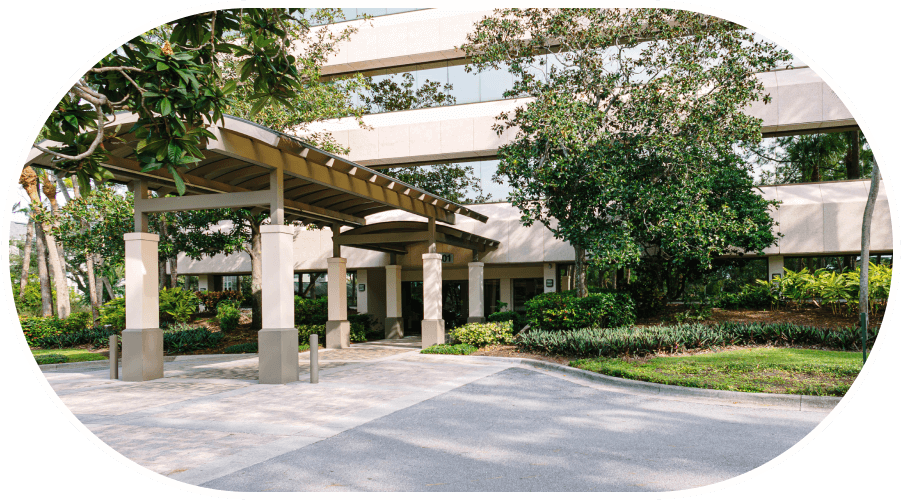Macular Degeneration / AMD
As a person ages, their vision can deteriorate over time. One of the most common causes of vision loss in older adults is age-related macular degeneration (AMD).
AMD occurs when the macular cells deteriorate and cease to function properly. The macula is the central area of the retina that controls our central vision; it’s used for fine-detail activities such as driving, facial recognition, reading, and recognizing color. As macular degeneration progresses, it can make objects in your line of vision appear distorted. Patients with AMD may also experience clouded vision or a layer of darkness over the central visual field. Eventually, patients may lose the ability to see details, which can impair normal daily activities. AMD is categorized into two different types: wet and dry AMD.
Fortunately, because macular conditions like AMD impact only the macula, the rest of the retina typically remains unaffected, keeping peripheral vision intact. As such, AMD rarely results in total vision loss.
What is dry age-related macular degeneration?
The most common type of macular degeneration is dry AMD. In dry AMD, the macular cells gradually reduce in number and become less sensitive. Vision loss tends to occur slowly over time, with cases ranging from mild to severe.
Typically, an ophthalmologist will note the presence of drusen, which are yellow deposits of debris that build up under the macula. Drusen are normally seen in patients aged 50 and older. While drusen deposits are not responsible for vision loss alone, their presence signifies a greater risk for developing macular issues in the future.
What is wet age-related macular degeneration?
Dry AMD sometimes progresses into wet AMD, which is characterized by the growth of abnormal blood vessels that leak fluid or bleed into the macula. If left untreated, wet AMD can cause permanent loss of central vision. Unlike dry AMD which happens over time, the onset of wet AMD can happen suddenly and result in a severe decline in vision.
AMD Symptoms
AMD may present with no symptoms at first, especially dry AMD. As time goes on, you may experience several changes in vision, such as:
- Blurriness
- Straight lines appearing wavy and other distortions
- Missing areas of vision
- Clouded or darkened vision
- Difficulty performing fine-detail activities, such as reading
AMD Risk Factors
There are several risk factors that can increase a patient’s chance of developing macular degeneration. These risk factors include:
- Age
- Genetics
- Tobacco use
- Obesity
- High-fat diet
- High cholesterol
- High blood pressure
- Cardiovascular diseases, such as atherosclerosis
Can AMD be prevented?
Because macular degeneration is so closely linked to aging, prevention recommendations normally involve a healthy diet, weight management, cutting out tobacco use, and protecting your eyes from the sun’s harmful UV rays. The Age-Related Eye Disease Study 2 (AREDS 2) looked at the effects of antioxidant vitamins and minerals on patients with AMD. It found that patients who took a high amount of these substances had a lower risk of developing more severe types of vision loss. The doses used in the study were:
- Vitamin C, 500 mg
- Vitamin E, 400 IU
- Lutein, 10mg
- Zeaxanthin, 2mg
- Zinc, 80mg
- Copper, 2mg
Please connect with your doctor directly per advice for supplement use, including type(s) and dosage to best ensure healthy vision.
AMD Treatment
Treatment for dry AMD typically consists of preventative measures and vitamin usage. However, as of February 2023, there is now a medication known as Syfovre™ that has been approved by the US Food and Drug Administration (FDA) for treating geographic atrophy – an advanced complication of late-stage dry AMD that causes blindness. Connect with Retina Group of Florida to learn more about this groundbreaking treatment.
In cases of wet AMD, your doctor will recommend treatment depending on the severity of your symptoms. When wet AMD is detected early the current treatments give a reasonable chance to recover vision in many patients thus emphasizing the importance of early detection strategies. These treatments include intravitreal injections of anti-vascular endothelial growth factor (anti-VEGF) medications and laser treatments. Although vision loss from wet AMD is typically permanent, early detection and treatment can often provide an optimal outcome.
While there is currently no cure, AMD is one of the most researched retinal conditions, with many clinical trials dedicated to developing new and improved treatments.
What should I watch for?
Your doctor will schedule regular follow-up appointments to monitor your condition. In addition, monitor your vision with an Amsler grid at least twice a week, so that any changes in vision will be recognized as early as possible. Instructions on how to use the grid will be provided. Any persistent changes—waviness of the lines, blank or missing lines, or blurring of the lines—should be reported to your doctor immediately. Early detection is our best defense against visual loss in macular degeneration!
New Medication Available for Geographic Atrophy
Geographic atrophy is a vision-threatening condition that occurs during the late stages of dry AMD. Previously, no treatment options were available, but thanks to groundbreaking research, the FDA has approved the first and only treatment for geographic atrophy. Learn more about Syfovre™.


